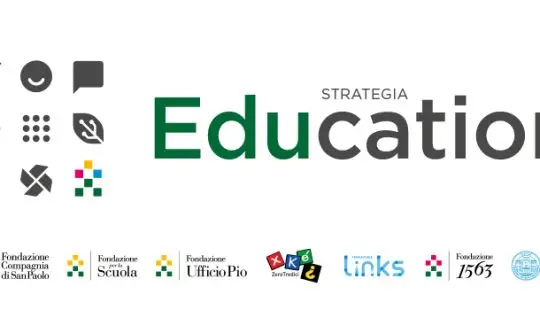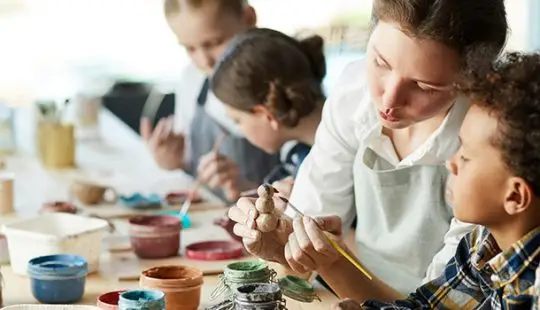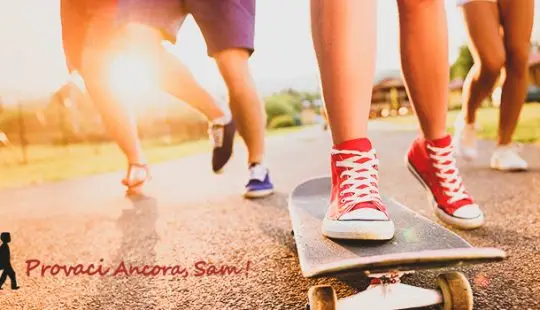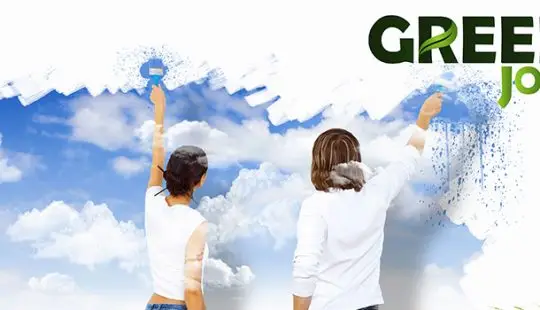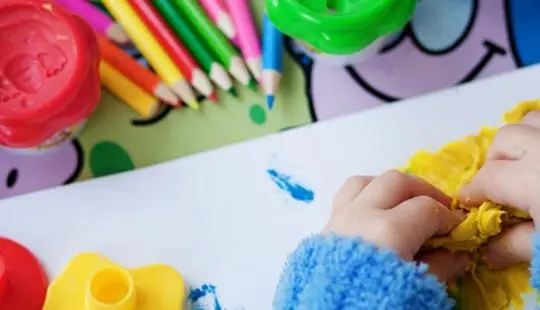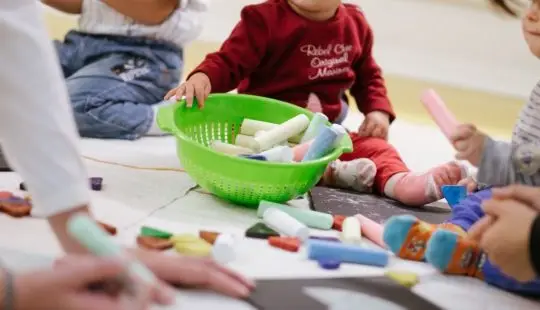We promote opportunities for children and teenagers to achieve their full potential, acquire appropriate knowledge and skills and shape their own lives from birth, as part of a continuous learning process. We involve communities and families so as to provide everyone with education based on respect, sustainability and sharing, as a solution to educational poverty and all forms of inequality.
Our work is divided into various areas of intervention.
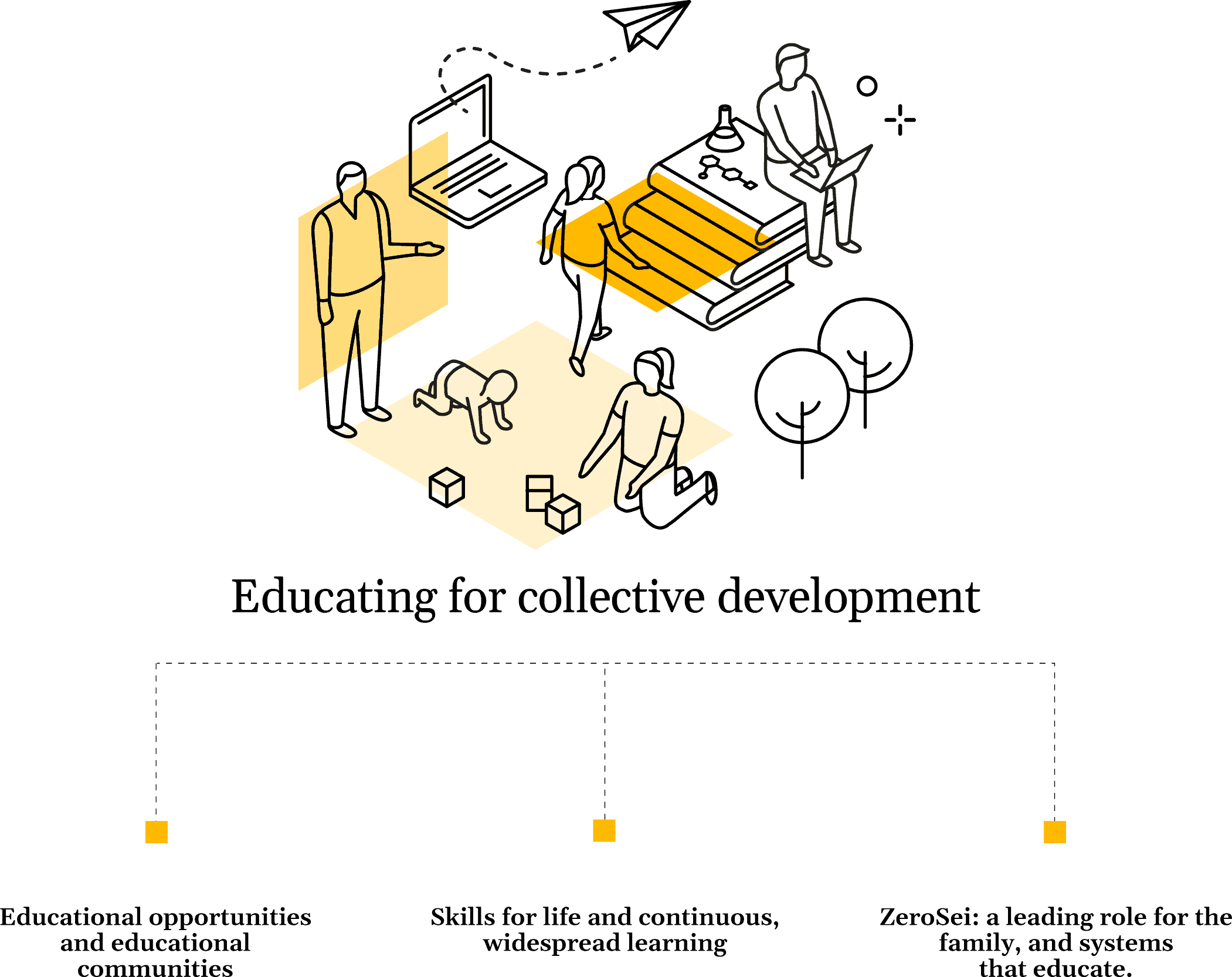
Supporting education reinforces the foundations on which the welfare of individuals and their communities is built. This is why the remit of the People Goal covers education, through the Educating for collective development mission, whose name highlights the concepts of both personal growth and collective endeavour. The mission collaborates with Fondazione per la Scuola, Ufficio Pio and Consorzio Xké ZeroTredici (Spazio ZeroSei and Xkè? Il laboratorio della curiosità ), which are auxiliary and co-governed bodies of FCSP.
ZeroSei: a leading role for the family, and systems that educate.
Long before the Educating for collective development mission was established, we were already running trials of innovative systems, capable of integrating and supporting a variety of skills common to child development. The aim is to promote the development of an educational ecosystem that takes care of children in their early years and learns from its own experience, starting with the active involvement of families, so that they take on a leading role in early years development, within the framework of positive, well-informed parenting.
Several projects have enabled us to develop replicable, measurable models. These include a coordinated set of ZeroSei actions focusing on early childhood, which is a key stage in cognitive, psychological, physical, linguistic and social development. In this regard, it is also important that children and adolescents are able to design the future of their cities: Una comunità che educa promotes dynamism among children and their families as part of an integrated local project involving educational opportunities outside of school hours for 0 to 18 year-olds in the Barriera di Milano district of Turin.
Educational opportunities and educational communities
We also pay close attention to inequality in the educational arena, and endeavour to promote the development and welfare of all children and adolescents, especially from population segments and geographical areas at risk of vulnerability. Andiamo oltre, implemented in conjunction with Fondazione Carige, and #extragram are calls for proposals designed to ensure that everyone has fair access to high-quality educational opportunities, as in the WILL – Educare al futuro project, supported by the social enterprise Con i bambini and developed in collaboration with Fondazione Cassa di Risparmio di Firenze, Fondazione di Sardegna, Fondazione Tercas and the involvement of Ufficio Pio, to encourage low-income families to invest in their children’s school career and training.
We therefore support the development of resilient educational alliances and communities that have the ability to offer appropriate, widespread and integrated solutions, as in the case of the 2020. Un’estate insieme summer school programme, developed with Fondazione per la Scuola, Ufficio Pio and Consorzio Xkè? ZeroTredici in coordination with Turin City Council, Piedmont Regional Education Authority, third-sector organisations, oratories, Turin’s cultural institutions, and other initiatives developed in this area, some in conjunction with the Developing skills mission. This initiative gave rise to a joint pathway involving FCSP, Turin City Council, Piedmont Regional Education Authority and Fondazione per la Scuola, aimed at designing a new, widespread, multidimensional, hybrid model of education based on cooperation between multiple parties.
In Liguria, with the Genoa People Friendly project, we kick-started a process of civic and community creativity, in which children and young people were chosen to be the first beneficiaries of a new way of experiencing the city and its common spaces. The initiative as a whole values all children and young people, irrespective of age, gender and social background. Within the framework of the various projects, we subscribe to the National Fund to Combat Juvenile Educational Poverty coordinated by ACRI, and we support organisations in Piedmont and Liguria involved in calls for proposals concerning infancy, childhood and adolescence, in partnership with the social enterprise Con i Bambini.
Skills for life and continuous, widespread learning
Ensuring that every new generation grows up with adequate cognitive, cultural, social and personal abilities means, first and foremost, promotingschool inclusion, facilitating early guidance and preventing educational failure by means of educational agreements between schools and communities, accurately targeted interventions – such as the Provaci ancora, Sam! project for promoting school attendance and success – and an innovative approach to teaching, such as in the Riconnessioni digital education project, both of which were implemented with the collaboration of Fondazione per la Scuola.
Our aim is to help create a new educational model that encourages young people to embrace continuous, widespread learning and enables them to develop cognitive and non-cognitive skills that will help them make the most of their potential, make better-informed personal and employment-related decisions and follow lifelong learning pathways.
These are the aims of two very important projects: Green Jobs, a programme promoted by ACRI, focusing on education in entrepreneurship and environmental sustainability, and Ricostruire non basta: pensiamo al futuro (Rebuilding is not enough: let’s think about the future), dedicated to the children of Valpolcevera and aimed at designing new opportunities after the collapse and reconstruction of the Morandi Bridge in Genoa.
Torino Fa Scuola is another project aimed at helping young people grow into constructive citizens, by providing suitable learning environments for the challenges of the future. The project is a new model for upgrading school facilities in partnership with education experts, architects, children and educational communities.
